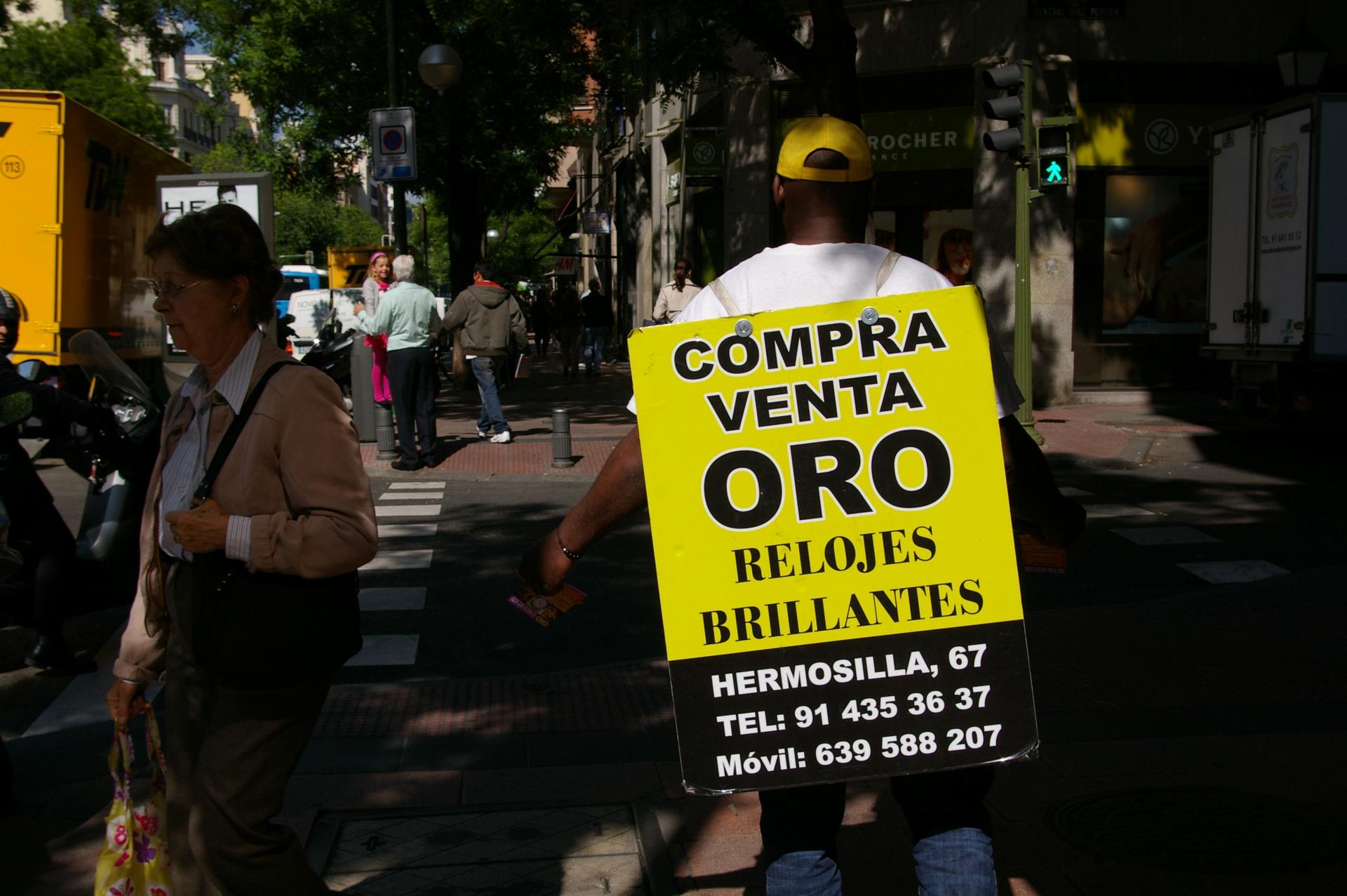Gold dealers provide needed cash in struggling Spain
Advertising a gold buyer in Madrid, Spain.
MADRID, Spain — Last year, the luxury Westin Palace Hotel here became the home of Europe’s first-ever gold vending machine. Offering buyers gold bars weighing between 1 gram and 10 grams (about a third of an ounce), the “Gold to go” dispenser came covered in a thin layer of the precious metal. At a time when the price of gold was rising sharply, the machine reflected how highly prized the metal is in times of uncertainty.
The other effect of gold's high price became evident as hundreds of gold dealers sprung up around the country, relieving Spaniards of unwanted jewelry and trinkets as their country was buffeted by economic downturn and a sovereign debt crisis.
“There are a lot of people who have had their jewels in their house for 40 or 50 years and they don’t ever use them, so they sell them,” said Jesus Aguinaga, who works in central Madrid for a business that buys and sells gold. He stands in the street, inviting passersby into the store to sell their valuables.
“They bring all kinds of objects: chains, bracelets, rings,” he added. “There are people who have old coins and they get fed up of having them in the house so they sell their collection. And there are also people who sell us their gold teeth.”
There are no official figures, but El Pais newspaper reported that in the southern region of Andalusia alone there were about 500 such businesses in 2010, three times more than a year earlier. These gold dealers are present in other cities and towns across Spain, and are usually small establishments with exteriors painted a gaudy yellow.
“Gold is seen internationally as the classic ‘refuge asset’ in unstable times — that’s always been the case throughout history — and that’s why it has risen in value so much lately,” said Francisco Lopez, an analyst at XTB brokerage in Madrid.
Gold has set records recently, breaking the $1,500 per troy ounce mark in April, amid continuing economic concerns as well ongoing turmoil in the Middle East and upheaval from the Japan earthquake. The price tumbled last week, but remains about $1,500 per troy ounce.
The economic problems ordinary Spaniards are facing have helped fuel a demand for quick cash here, which has helped the gold vendors. A decade-long real estate boom collapsed as the world financial crisis hit in 2008, followed by the euro zone’s own debt drama last year. Spain remains among the nations that face intense speculation over their ability to finance government debt.
A painful reform program implemented by the Socialist government has seen the country start to bring its finances under control and so far, at least, it has avoided the fate of Greece, Ireland and Portugal, all of which have requested emergency bailout loans from the European Union.
But Spain’s economy is still growing slowly and its jobless rate of 21 percent is the highest in the European Union. The government’s austerity measures include cuts to benefit payments for those out of work. With gold dealers advertising that they will pay about 26 euros ($38.50) for a gram (0.04 ounces) of gold, many are cashing in their valuables.
“People don’t have money right now, so they come to us,” said Juan Vasquez, who works for a gold business in downtown Madrid. “All kinds of people come to sell their gold. And apart from being a business, we’re actually helping people by giving them money.”
He defended the establishments from some recent media claims that they exploit uninformed customers by paying below market value.
However, there are signs Spain’s gold rush is starting to lose its luster. Some analysts, such as Francisco Lopez, don’t expect the price of the metal to maintain its record highs for long. And perhaps just as crucially, the sheer number of gold dealers across the country means competition is fierce and profits are slim. Many gold businesses are already shutting down.
The competition is good, however, for people who have no other option, like Ecuadorian nanny Herminia Ordonez.
“I am going home to Ecuador, so I need some money for the ticket,” she said, walking into a downtown Madrid gold dealer, jewelry in hand.
Every day, reporters and producers at The World are hard at work bringing you human-centered news from across the globe. But we can’t do it without you. We need your support to ensure we can continue this work for another year.
Make a gift today, and you’ll help us unlock a matching gift of $67,000!
